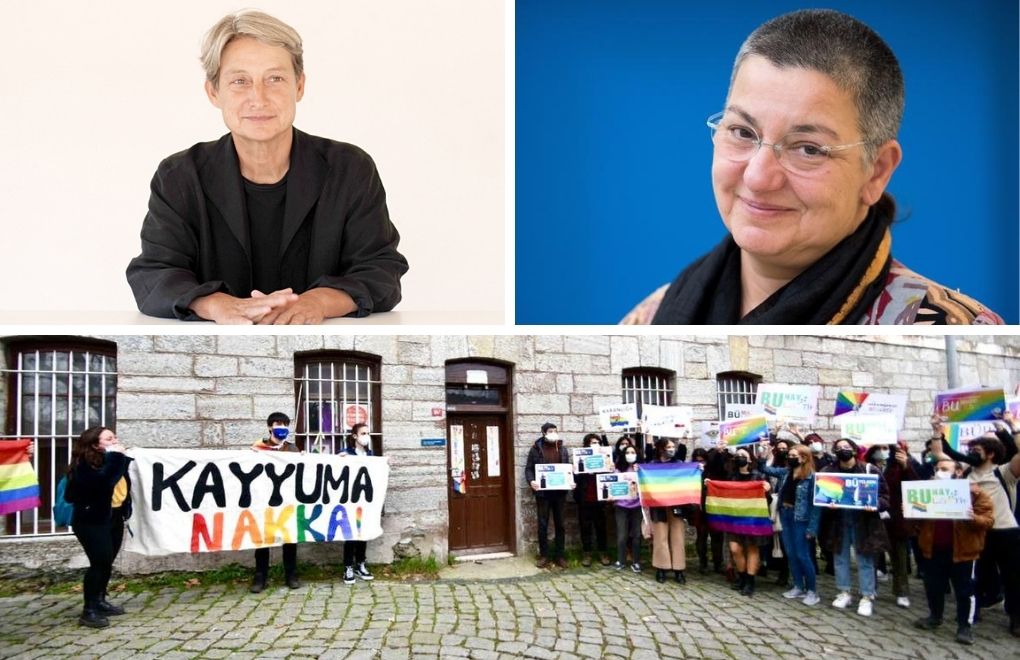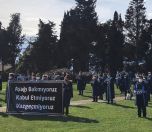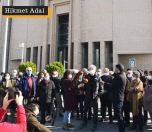Click to read the article in Turkish
Since President and ruling Justice and Development Party (AKP) Chair Recep Tayyip Erdoğan appointed Prof. Melih Bulu as a rector to Boğaziçi University on January 2, both the students and faculty of the university have been protesting against this appointment.
As part of these protests going on for nearly 2 months now, open courses are also offered at the South Campus of Boğaziçi in İstanbul.
US philosopher, academic and gender theorist Judith Butler from Berkeley University will give an open course on "Transregional Solidarities" to Boğaziçi University students at 9 p.m. tomorrow (February 24). The course will be held online and can be watched live on YouTube.
Butler will also celebrate her birthday live with students.
Prof. Şebnem Korur Fincancı, the Turkish Medical Association (TTB) Central Council Chair, will also give an online course to Boğaziçi students tomorrow. Korur Fincancı will address the students at Zoom at 2 p.m. and talk about "Academia and Human Rights in Turkey."
About Judith ButlerJudith Butler is Maxine Elliot Professor in the Department of Comparative Literature and the Program of Critical Theory at the University of California, Berkeley. She received her Ph.D. in Philosophy from Yale University in 1984. She is the author of several books: Subjects of Desire: Hegelian Reflections in Twentieth-Century France (1987), Gender Trouble: Feminism and the Subversion of Identity (1990), Bodies That Matter: On the Discursive Limits of "Sex" (1993), The Psychic Life of Power: Theories of Subjection (1997), Excitable Speech (1997), Antigone's Claim: Kinship Between Life and Death (2000), Precarious Life: Powers of Violence and Mourning (2004); Undoing Gender (2004), Who Sings the Nation-State?: Language, Politics, Belonging (with Gayatri Spivak in 2008), Frames of War: When Is Life Grievable? (2009), and Is Critique Secular? (co-written with Talal Asad, Wendy Brown, and Saba Mahmood, 2009) and Sois Mon Corps (2011), co-authored with Catherine Malabou. Her most recent books include: Parting Ways: Jewishness and the Critique of Zionism (2012), Dispossession: The Performative in the Political (co-authored with Athena Athanasiou 2013), Senses of the Subject and Notes Toward a Performative Theory of Assembly (2015), and a co-edited volume, Vulnerability in Resistance, with Duke University Press (2015). Her books have been translated into more than twenty-seven languages. She served as a founding director, with Martin Jay, of the Critical Theory Program and the International Consortium of Critical Theory Programs at UC Berkeley and served as Department Chair of the Department of Rhetoric in 1998-2003 and 2006-7, and the Acting Chair of the Department of Gender and Women's Studies, 2002-3. She also served as the Chair of the Board of the University of California Humanities Research Center in Irvine. She has served on the Executive Council of the Modern Languages Association and chaired its committee on Academic Freedom and will serve as President of the organization in 2020. She is also affiliated faculty with the Psychosocial MA Program at Birkbeck College in London and the Hannah Arendt Chair at the European Graduate School in Sass Fee, Switzerland. Butler has been active in several human rights organizations, including the Center for Constitutional Rights in New York and the advisory board of Jewish Voice for Peace. She was the recipient of the Andrew Mellon Award for Distinguished Academic Achievement in the Humanities (2009-13). She received the Adorno Prize from the City of Frankfurt (2012) in honor of her contributions to feminist and moral philosophy, the Brudner Prize from Yale University for lifetime achievement in gay and lesbian studies, and was named the Albertus Magnus Professorship from the City of Cologne, Germany in 2016. She is as well the past recipient of several fellowships including Guggenheim, Rockefeller, Ford, American Council of Learned Societies, and was Fellow at the Institute for Advanced Study at Princeton and at Ecole Normale Superieure in Paris. In 2014, she was awarded the diploma of Chevalier of the Order of Arts and Letters from the French Cultural Ministry. In 2015, she was made an "honorary geographer" by the American Association of Geographers and was elected as a corresponding fellow of the British Academy. She is a member of the American Philosophical Society and was elected to the American Academy of Arts and Sciences in 2019. * Source: Berkeley University |
About Şebnem Korur FincancıProf. Dr. Şebnem Korur-Fincancı is a rights advocate, the Central Council Chair of the Turkish Medical Association (TTB) and the former Chair of the Human Rights Foundation of Turkey (TIHV). The Foundation is involved in the documentation of the cases of torture, rehabilitation of its victims and provision of legal assistance to them. Korur-Fincancı is also one of the founding members of the Forensic Doctors' Association and has played the major role in the development of the United Nations reference standards on the investigation and documentation of the cases of torture, the Istanbul Protocol. She has conducted forensic investigations to expose torture in multiple countries and in 2014 she received the International Hrant Dink Award. She has also been one of the founders of the Turkish Penal Code Association. Devoting her professional life to the investigation and documentation of torture as well as struggle against it, Korur-Fincancı has become one of the milestones in Turkey in that regard. Preparing reports on cases of torture and writing on medical ethics in the 1990s, when torture was prevalent in Turkey, she was met with the oppression and obstacles by the state. In 1997, she became the Head of Forensic Medicine Department at İstanbul University. In 2004, she was dismissed from this post. In 2005, she was reinstated by the Administrative Court and as per the decision of the Council of Higher Education (YÖK). Korur-Fincancı also participated in the Editors-in-Chief on Watch campaign that was launched in solidarity with the Özgür Gündem newspaper, which was closed as per a Statutory Decree. Korur-Fincancı was arrested on June 20, 2016 for having participated in the campaign and was released on June 30. |
What happened?Prof. Melih Bulu was appointed as the President of Boğaziçi University in a Presidential Decree published in the Official Gazette on January 1, 2021. The appointment of Bulu sparked harsh criticisms among both the students and academics of the university as well as in the academic community. Appointed to Boğaziçi, one of the most prestigious universities in Turkey, from outside its community, Bulu was a candidate for nomination to run in the Parliamentary elections in 2015 for the ruling Justice and Development Party (AKP), which is chaired by President Recep Tayyip Erdoğan. The students and several students' clubs of the university campaigned on social media under the hashtag #kayyımrektöristemiyoruz (We don't want a trustee-rector). The call of the students was also supported by the faculty members of the university, who released a joint statement on January 3. "An academic outside Bogazici University community was appointed as rector (university president), which is a practice introduced for the first time after the 1980s military tutelage," read their statement. Amid harsh criticisms of students and faculty members, Prof. Bulu shared a message on his Twitter account, welcoming his appointment to the position, saying, "We are all in the same boat." The students protested the appointment of Bulu in front of the South Campus of the university in İstanbul on January 4. However, the police intervened into the protest with pepper gas and plastic bullets. Next day, it was reported that there were detention warrants against 28 people for "violating the law on meetings and demonstrations" and "resisting the officer on duty." Later in the day, 22 of them were detained. 40 people in total were detained over the protests. All of the detained were released on January 7 and 8, 2021. The protests of students and faculty members at the South Campus of Boğaziçi University have been going on since January 4. Taken into custody over a picture of the Kaaba, a sacred site in Islam, with a Shahmaran figure and four LGBTI+ flags on its corners, two students were arrested and two were placed under house arrest over this picture displayed at an exhibition as part of the protests at the South Campus. On February 1, police stormed the South Campus and intervened into the students' protests. Earlier in the day, the students gathered in front of the campus for the protest. Police hindered the protest while also preventing the students inside the South Campus from joining their friends outside. With the 51 students taken into custody inside the campus in the evening, the number of detained increased to 159. In a statement released by the İstanbul Governor's Office in the early morning hours on February 2, it was announced that 98 students were released from detention. On February 2, Boğaziçi University students gathered in Kadıköy Rıhtım for another protest, which was attacked by the police with plastic bullets and tear gas. 134 people were taken into custody by the police. Two of the protesters were arrested by the court afterwards. On February 6, four more people were arrested and two others were placed under house arrest over their participation in Boğaziçi protests in Kadıköy. On the same day, Erdoğan issued a Presidential decree to open two new faculties at the university. In response to this, the Boğaziçi Solidarity platform addressed an open letter to the "12th President of Turkey." A day later, student Beyza Buldağ was taken into custody for allegedly administering the "Boğaziçi Solidarity" Twitter account and arrested for "provoking the public to hatred, enmity and hostility" and "provoking to commit crimes" over both the letter and other Twitter posts. As of February 7, the Boğaziçi Solidarity platform announced that at least 560 students were detained, 25 were sentenced to house arrest and 10 were arrested. Students have been arrested on charges of "degrading or provoking the public to hatred and hostility" and "resisting to prevent fulfilment of duty" as per the Articles 216 and 265 of the Turkish Penal Code (TCK). CLICK - Why are 11 university students arrested? On February 10, one more student was arrested. With the release of Beyza Buldağ and Muhammed Önal on February 12, there remained nine students arrested over Boğaziçi University protests against the appointed rector. On February 22, two more students were placed under house arrest on the grounds that they distributed the letter of an arrested student to citizens. |
(DŞ/SD)






